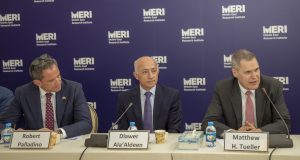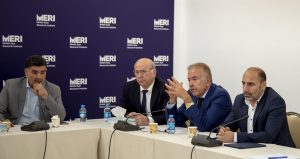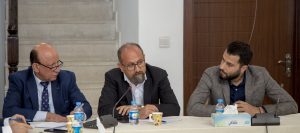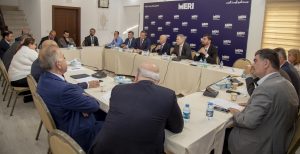“We are making good progress on constructing a permanent Consulate General in Erbil, the largest US Consulate facility anywhere in the world. And I see that as the nature of the long-term strategic commitment that the United States has to Iraq and to the Kurdistan Region”, said Matthew H. Tueller, the United States Ambassador to Iraq, in a MERI policy debate on 15 May 2022.
In this special roundtable, Amb. Tueller outlined the US policies in Iraq and stressed that the strong and long-term strategic partnership between the two countries goes far beyond the military aspect of relationship. It intends to move towards a “shared goal of Iraq as an emerging strong, stable and sovereign state”, which can protect its borders and ensure that no armed forces outside of the government control can influence inside. These are “ongoing challenges” that Iraq faces and the US is trying to help in overcoming them.

Democracy in the Middle East
Amb. Tueller emphasised that the US rejects the misconception which believes that democracy cannot grow in some regions or countries. People all around the world and including the Middle East aspire to have a legitimate and responsive government which can deliver basic needs and protect its citizens. He added that it is not only in the interest of the people of the Middle East to build stable and democratic countries, but also in the interest of the US as well. To achieve a legitimate and responsive government, there has to be a political system which allows for holding fair and free elections, where the political parties can be elected based on their political programs for serving the people.
Iraq as a model
Despite the major challenges that Iraq faces, Amb. Tueller remained “very hopeful for the future of Iraq” and believed that it can be a model for the whole Middle East- which can be transformational. According to the Ambassador, the US believes that Iraq is on a path towards democracy, but it needs stronger security services which can provide security to civilians and its territory, and needs a government that is not infiltrated by militias, non-state armed groups and criminal groups which weaken state institutions. There is positive progress when it comes to forming a new government in Iraq and the last general election was the most open and transparent election in the post-2003 Iraq. However, there were some instances which occurred after the election, where some militias attacked the US Consulate General in Erbil and other areas in the Kurdistan Region of Iraq (KRI). Amb. Tueller stressed that these attempts and attacks must be rejected and condemned.
Looking back at his three-year experience in Iraq, Amb. Tueller considered the mass protests of October 2019 by the young Iraqis as the most significant event. It was ‘surprising’ when young Iraqis protested against the Iraqi government and demanded that their voices be heard. The protesters rejected the political parties and the government of that time because they believed that they were not serving the Iraqi people and were representing the interests of other countries rather than Iraqis. These protests resulted in the government resignation and early elections.

The US is here to stay
On the long-term future of US-Iraq relations, Amb. Tueller emphasised that the US has a long and enduring strategic interest with Iraq and “will remain in Iraq and will partner with the Iraqis who want to establish a stable and strong democratic Iraq”. He referred to the July 2021 Strategic Dialogue between the two countries which is seen as a mechanism to reset their relationships.
“We see Iraq as a linchpin for security and stability for the Middle East region”, he stated. Iraq will become even more of a strategic partner in the coming years as the effects and consequences of climate change arise in Asia, Europe, Middle East and Africa. For the US, it will be easier and more strategic to work with an Iraq that is stable and strong to fight the causes of climate change in the region.
The KRG-Baghdad relationships
Amb. Tueller believes that there are a number of ambiguities between Erbil and Baghdad which have caused escalations and conflicts. There is good will between the two sides and there are political parties among the Kurds, Shias and Sunnis who seek to find enduring solutions for the ongoing conflicts in Iraq. However, until now, both sides have mainly focused on their short-term goals and interests rather than long-term solutions and resolving ambiguities.
A strong Kurdistan can be better protected when there is a stable and sovereign Iraq, according Amb. Tueller. Thirty years of high level of autonomy gave the KRI the opportunity to prosper and develop in many sectors. Comparing it to other parts of Iraq, the KRI is a better place for investment and tourism, said the Ambassador. He also acknowledged that the US is saluting the level of support and security which the KRG provided to other Iraqis who fled to the KRI, including religious and ethnic minorities from other parts of Iraq. He appreciated the political culture and tolerance tradition of the KRI in welcoming and providing shelter for the internally displaced persons.
On the Peshmarga reform, Amb. Tueller stated that the US and the International Coalition against ISIS help both Peshmerga and Iraqi security forces in building joint coordination cells in areas where there is a security gap between the two forces. They support the Peshmerga reforms within the Ministry of Peshmerga to establish a modernized, unified and disciplined force.

North-East Syria (Rojava)
Amb. Tueller stated that the Syrian Democratic Forces (SDF) have been a strong and very effective US partners in the fight against ISIS in Syria. “This partnership with SDF has been essential”, but “that does not mean we are trying to establish a North-East Syria Autonomous Region”. He stressed that the SDF fully understands this fact. According to the US policy in Syria, the Syrian Kurds have to be part of the new Syria and included in future talks about rebuilding the country. Concerning the PKK, the close alignment of the YPG in Syria with PKK is problematic and creates perplexities for the US in the region. Amb. Tueller stated that the PKK alignment with Shia groups in Sinjar is another challenge for Iraq and the KRI.
Persona Reflections
When asked about his best moments in his three-year experience in Iraq, Amb. Tueller cited two specific events. One was the conference that was organised by Prime Minister Kadhimi in August 2021. A group of Arab and neighboring political leaders were invited to come to Baghdad and discuss the ongoing issues in the region. He stressed that the US encourages Iraq to have a normal relationship with Iran, but it should be based on mutual respect for sovereignty. Also, the US acknowledges the fact that both Iraq and Iran have deep cultural and historical affinities and shared interests.
Another good moment was during an event organised by the US Embassy in Baghdad for young Iraqi boys and girls between 8 to 11 years, coming from camps. They were invited to come to the Embassy and spend the day there, allowing them to use the facilities and interact with the staff. There was one girl who sang a song to express her gratitude to the Embassy and opened the door for all the other young participants to sing their preferred songs and share their feelings with the Embassy.

Under Chatham House Rules
This roundtable was attended by a number of policy makers, politicians, media professionals and academic experts as well as the US diplomats, including the US Consul General in Erbil and his staff (listed below). The Ambassador’s presentation was followed by a highly engaging discussion which was carried out under Chatham House Rules. During this part, a number of issues were highlighted and discussed by various participants, which are summarised here without attribution or affiliation.
- Some participants pointed out that there is a high level of hopelessness and frustration from the Iraqis about the Iraqi state. There is a low chance for the Iraqi government to overcome its ongoing challenges and problems. The low turnout in the last Iraqi elections especially by the young generation was an indicator that the current state institutions and political parties are not trusted anymore.
- It was argued that Iraq cannot be compared to Afghanistan when it comes to state failure and taking a similar path because the institutions in Iraq are stronger and Iraq has a history of a centralized state. The changes in the regional dynamics will affect Iraq’s future because it is surrounded by strong regional powers.
- The oil and gas disputes between Erbil and Baghdad are highly politicized. There are ambiguities in the oil and gas law in Iraq. However, there is good will to resolve these issues. But the Iraqi government should pass a law, and this is only possible after forming a new government in Baghdad. There are win-win situations for both Baghdad and Erbil on how to manage the oil and gas sector, but it requires a strong political leadership and good governance in Baghdad.
- Iraq needs a political system which can include all of the different ethnic and its diverse communities together.
- Iraq is facing an environmental crisis which will get worse in the coming years due to the effects of the climate change. There will be severe negative impacts of global warming if the Iraqi government does not take actions to minimize them. The US through its Assistance Development Funds helps Iraq and its neighboring countries to solve the water resources management. Turkey, Iran, Syria and Iraq have to sit down and discuss the lack of water resources and find solutions and cooperative actions to face water shortages.
- For Iraq to survive, it needs to fight corruption and build strong and responsive state institutions. This requires a good political leadership and good cooperation among Iraqis. The non-state armed groups have to be disentangled from the Iraqi security forces and the state institutions. They must be dismantled for the state to function.
- There are high potentials for the US investors to invest in Iraq in different sectors such as in agriculture, health care system, education, housing, banking and e-financing. So, Iraq can take these opportunities and encourage foreign investors to come to Iraq. This is fundamental for Iraq to flourish economically and create thousands of jobs in the private sector. However, corruption, insecurity and long bureaucratic procedures in Iraq were considered major obstacles for foreign investors.
Participants:
- Abdulsattar Majid, Justic Group in Kurdistan (KOMAL)
- Bahar Ali, Women Rights Activist
- Dara Khailani, Adviser to the Deputy Prime Minister KRG
- Dlawer Ala’Aldeen, President of MERI
- Fuad Smail, Director of HR, MERI
- Hemn Lihony, Rudaw Media Network
- Hoshyar Siwaily, Kurdistan Democratic Party
- Kamaran Palani, Research Fellow, MERI
- Khanzad Ahmed, High Council of Women’s Affairs of KRI
- Mahmoud Nash’at, Advisor, KRI Parliament
- Matthew H. Tueller, US Ambassador to Iraq
- Nahro Zagros, Academic
- Nawzad Hadi, Advisor to the President of Kurdistan Region
- Osman Laylani, Academic, Salahaddin University
- Robert Palladino, US Consul General in Erbil
- Sarbaz Hamakhan, US Consulate
- Seth Patch, US Consuate
- Spencer Fields, US Consulate
- Srush Khoshnaw, Researcher
- Stam Kamil, Change (Gorran) Movement
- Tanya Gili Khailany, Cofounder of SEED Foundation

